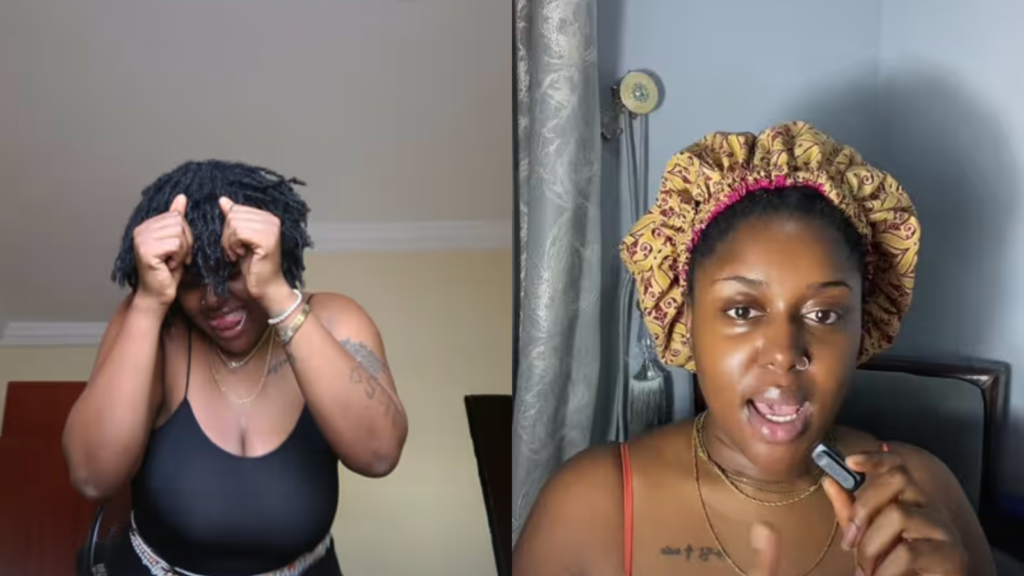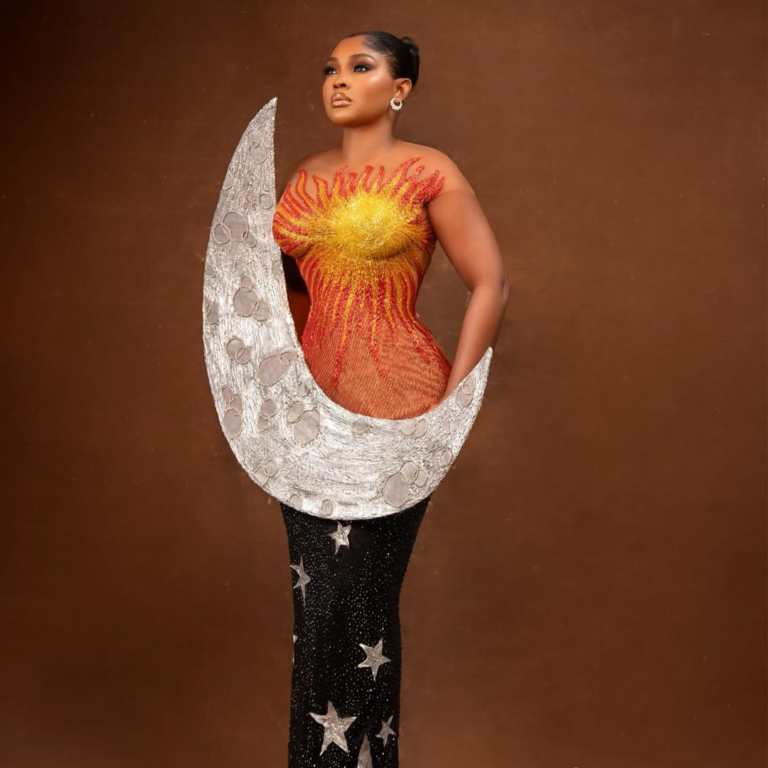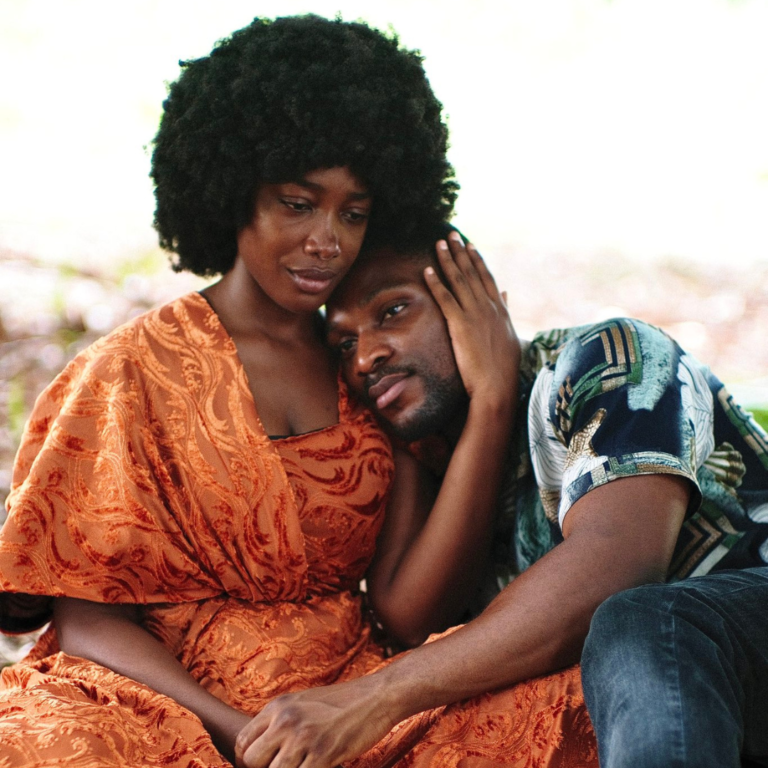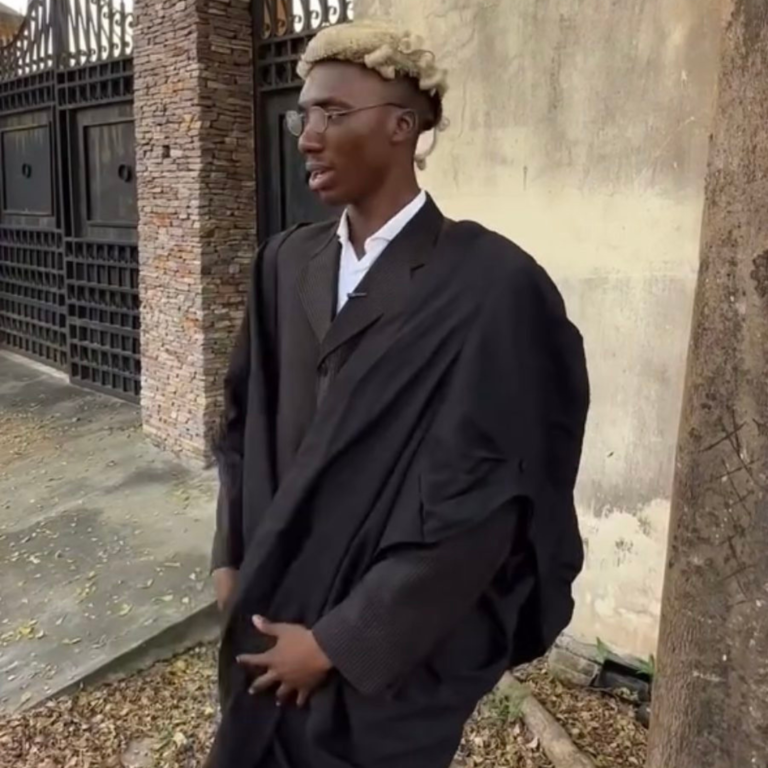Aida had just moved back to Nigeria. Her life in the UK had not been bad. She had a corporate job that paid the bills. But it wasn’t what she wanted for herself. A year before her father died, she had told him about her plans to move back home. He was a great singer and orator. He had ALS and, in his last days, lost his voice. It “fucked” with her. So, with the clarity that sometimes comes with grief, she made the plunge.
Hours after she set foot into the country, her unpacked bags still lying in a room, she went on TikTok and saw a user post a picture of “a white Jesus.” “I was like, Jesus is not white?” she said in an interview with Zikoko. Then she posted her rebuttal; snarky, piercing, with a huge dose of wit. “That was my first content that did mad numbers.”
Some years later, she has become a kind of gossip whisperer on TikTok, the Gistlover for the Republic Journal set—her videos laced with historical context, narrative arcs, and catchphrases like “trigger warning.” And they are fact-checked.
“I used to be very adamant that I’m not a content creator. But three days ago, I had a bit of a moment with myself in my head, and I was like, ‘Aida, I think we want to do this. This is fun.’”
After the viral story on the “tradwive” was published in the Times of London, Aida was among the first creators with a vast Nigerian audience to jump on it. Feminists seized the story as emblematic of a backlash against female advancement. Among the Alpha male influencers, it was evidence that women were not built for the workplace. Aida’s own retelling of the story was laced with nuance, at times offering the story as a fairytale and then as a very weird episode of Get Me Out Of Here.
“One thing that cemented in me that I wanted to do this is the comments and messages that I get. ‘Ooh, my God, you explain such heavy topics with humour, and I’m still going to laugh.’ That was it for me,” she said.
“I think it’s because of my default perspective that the content comes off that way. The way I attack these stories is the way I see life. I am already of the default notion that nuances exist in everything that we do. It doesn’t make any sense for me to add insult. I don’t look for instances where I can insult people.”
She was born in Lagos. Her family moved to Texas in the US and then to California. She flew across the pond for university and ended up in the UK.
Aida was talking about how she got the name Aida, which was not her parents’ given name but has become the name friends and family use for her, and that her over 130k followers on TikTok know her as. It was her Spanish high school teacher who first called her Aida. Living in the US meant attending an American school where her classmates didn’t bother or sometimes just bluntly refused to pronounce her name properly.

Her name is Nnenna, Nnenna Ngene. But at home, she was also called Ada. So when she grew tired of Nnenna not being pronounced well, she started going by Ada at school. “Aida,” the Spanish teacher kept calling in class. Nnenna sat still in her chair. It could not have been her. Then the teacher walked to her desk and called her, “Aida.” She told her she was “Ada” but asked what “Aida” meant.
Aida—Gift, happy, moon. These types of things appealed to her, so she added the “i” to “Ada” and made it her name.
She didn’t come to TikTok unaware of the environment she was in—live sessions of TikTokers dragging each other for filth, “roast sessions,” and “read sessions.” She has had her fair share. In 2022, a TikToker called her out over an incident concerning a wig. Most recently, a male TikToker put up her picture for a read about something related to her body.
“I really just ignore. I choose not to engage,” she said. “Nigeria is a very classist society, and if you want to insult me, you tell me I’m broke, what’s next? Or you tell me I’m fat. A lot of these things don’t determine my self-worth.”
Moving to Nigeria when many young Nigerians are looking to japa is not strange to her family. Her brother, Michael Chukwuebuka Ngene like her, had earlier moved to Nigeria and got into the Big Brother Naija house. But even for them, her decision to move back came with pushback. Her mother didn’t want her to.
“I’ve been called stupid because all of us here are looking for means to japa. But I’m like, ‘It’s not for you to understand.’ I know the trajectory of my own life and where I’m going. I don’t want to shed my own identity working for someone. It’s not my dream to work in a corporate setting,” she said.
“My dream is to work at The Human Library. I read that there is a human library somewhere in Asia, and I said, ‘Where do I sign up?’ I want to listen and speak to people. The human experience is marvellous.”
On TikTok, she has spoken about everything from Bobrisky to Opeyemi Famakin and even cowgirl, the in/famous sex position (depending on who you ask). How does she decide on these topics?
“Anything I find interesting,” she said. “If there are a lot of details to the story, I’ll make bullet points. But a script is hard to follow. You can tell when I’m reading from a script. It doesn’t sound very human. I really just want to gist in front of my ring light.”
Like her brother, Aida also sent in her audition tape for Big Brother Naija but was rejected. She has a theory for why that happened.
“I live in the underbelly of the entertainment industry. The people that I kick it with, in the industry, we kick it at three in the night when the witches and wizards are outside. I don’t partake in oppression Olympics. I don’t have that personality. You know what classism does to people? You want to break away from being the underpart of classism, to get to the top and be like, ‘I too, I’m big.’ That’s not who I am at all. Because I don’t have that personality, and I’m now open with the things I support—I want you to question religion—that’s not good for business in Nigeria,“ she said.
“I will enter the house, and if somebody wants to make out with me and she happens to have a vagina, I might just make out with her. That is not good for business in Nigeria. I don’t beef them for the rejection. I completely understand it.”
In the past few months, creators have been open about government agencies showing up in their DMs with demands. The food critic Famakin recently revealed in an interview that after he bragged about how much he earns, FIRS demanded that he pay taxes. Aida has had her fair share. After she posted about a government agency, the agency reached out, and she said, “threatened me to take down the video.” She refused. It’s been almost a year since the incident.
“I’m not scared to open people’s yansh. Nigeria is not a just place, so if you lean toward being fair, being of that type of mentality is not good for business, especially as a woman. They want you to wear your bone straight. They want you to do your lashes. They want you to shut up and be pretty,” she said.
“I will not shut up.”
She has not outwardly advertised her content. She has not done “50% off for the next 48 hours” or “special packages for small businesses.” But she has received offers.
“I won’t say I’m the most moral person in the world. But I have principles,” she said. “I get a lot of offers from these organic bleaching cream people. And I’m like, ‘I used to insult people like you. Why will I go and promote it?’ And forex, too. I did a promo for one, but it really tugged at me, so I said, ‘Never again.’”
She also had someone who wanted her to promote their restaurant. “But then the conversation became, wear bone straight, do your eyelashes. And I said, ‘Nah.’”
She had a media upstart that wanted to produce a podcast for her. “They said they wanted to collaborate with a clinic in Lagos, and the clinic was going to give me a BBL. They were like, ‘It’s good for the image.’” She turned them down.
“I’m not easily digestible for the Nigerian society, especially because I am a woman. I am not going to bow down because someone reminds me that I get vagina,” she said.
But she didn’t say no to podcasts entirely. “What I’m leaning towards is YouTube. More long-form content. A bit more cinematic.” She has also started posting short-form vlogs.
I asked her where she sees herself in five years. “Lifestyle or career-wise?” she asked. Both. For career, she wants her podcast out, have a film she wrote in production and her book on someone’s shelf.
For lifestyle, she said, “I am in my garden with my cat. Hopefully, she may have had a baby or two, so it’ll probably be three of us. I enjoy being by myself, so I’ll still be by myself in a sprawling studio apartment in Enugu state, smoking some good marijuana.”




